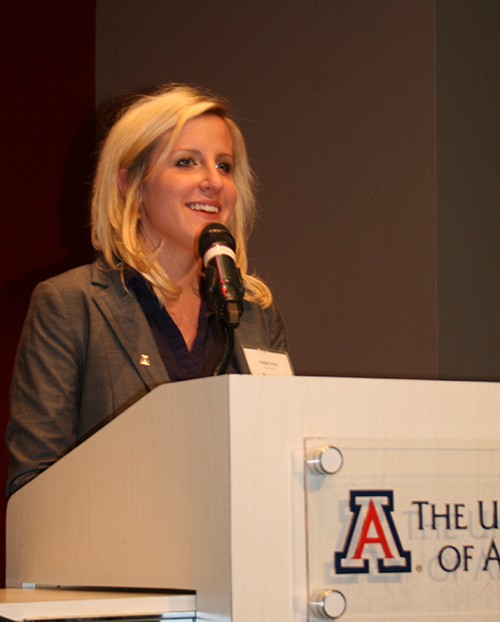A guitar twangs under the dim lights of the South Ballroom in the Student Union Memorial Center as about 100 people gathered to attend the second annual ASUA State of the Student address.
The event, which featured representatives from the Associated Students of the University of Arizona, Graduate and Professional Student Council and Arizona Students’ Association, gave the presidents of all those organizations the chance to address the challenges facing the student body and what they have done to address them.
Elma Delic, the board chair of Arizona Students’ Association, said that it had been a “”tumultuous year”” for higher education in Arizona, but praised the actions taken by student leaders across to protest proposed increases in tuition and fees.
“”We have all faced a number of challenges, none of which have been easy,”” Delic said. “”We fought hard against cuts, and we lobbied our leaders day and night, and as a result we won some victories.””
One of these victories was lowering the proposed cut to higher education from $235 million to $198 million, Delic said. Though she acknowledged that a cut this steep would still have far-reaching effects on the universities, she said getting any relief at all was a testament to ASA’s efforts.
Emily Connally, the president of GPSC, said that she sees how some might say the state of the UA’s 8,500 graduate students is grim, particularly as the university’s funding continues to fall to levels not seen in decades. But she said it was reassuring to see some of the actions taken by the university this past year.
Some actions Connally praised were the UA eliminating the Student Recreation Center summer usage fee for continuing students, a fact which was met with a round of applause. Connally also recognized Provost Meredith Hay’s efforts to secure $3 million in funding to lessen the workload of graduate workers on campus.
“”This will make it so they can focus on their own education, which is, after all, why most of us are here,”” Connally said.
Connally commended the UA administration for its efforts to pass new regulations regarding administrative leave for students who have recently had children.
The UA will now offer six weeks of leave wih graduate assistanceship to both new parents, who can focus on their family without fear of losing their jobs because of an extended absence, Connally said. She said that, to her knowledge, this is the only program of its kind among universities comparable to the UA.
She also applauded Carla Stoffle, the dean of UA libraries, for her efforts to help develop and implement more integrated and empirically supported online course offerings, both for graduates and undergraduates.
Connally discussed new policies from Campus Health Service, which is eliminating co-pays on certain preventative and diagnostic tests, such as screening for sexually transmitted diseases or cervical cancer. According to Connally, co-pays are also being phased out for standardized immunizations and counseling for tobacco and alcohol addictions, so long as students have valid insurance.
Last to speak was ASUA President Emily Fritze, who supplemented her remarks with a video depicting several different students and their varying experiences at the UA. Fritze spoke on how to keep a UA education relevant and impactful, especially in an environment where “”you can Google your way through college.””
Fritze said it was important for both Arizona and the United States to make higher education spending a priority.
“”We may parade about our superpower status, but if we continue to rank 15th to 20th in science, math and reading, we will lose that status,”” Fritze said.
She called the current cohort of students “”a generation of underdogs,”” who would have to fight against the stigma of being the first generation in national history to not be more successful than its predecessors. She said to change this trend, all parties involved, from students to legislators, need to realize their responsibilities. For students, that responsibility is to continue to take advantage of education provided to them and for legislators its “”not putting education on the back burner.””
“”We are our only fighting chance,”” Fritze said of students. “”Bear down, Arizona.””








